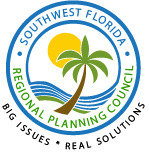Statutory Mandates
The Strategic Plan follows a format that is somewhat different than previous plans, which required that Regional Planning Councils prepare plans that were comprehensive in nature. Under the old format, the Regional Comprehensive Policy Plan was required to address each of the 26 goals in the State Comprehensive Plan. Due to changes in the rule that governs regional plans, however, Regional Planning Councils are now required to address only five issues. Additional issues can be included if the Regional Planning Council so chooses.
The Intergovernmental Coordination and Review (ICR) process is a federally-mandated program to make state officials aware of federal projects, programs and documents of statewide significance that may affect them. State Executive Order 83-150 designated Florida’s Regional Planning Councils as “regional clearinghouses.” This designation calls for the Councils to review such projects to determine their significance.
The Council routinely reviews many types of projects and proposals as a part of its ICR work.
They include:
- Ten-Year Site Plans for power companies that serve Southwest Florida,
- Dredge and Fill Permit Applications filed with the U.S. Army Corps of Engineers,
- Federal Consistency projects from the Florida State Clearinghouse/Florida Coastal Management Program,
- Environmental Resource Permits issued by Water Management Districts and the Florida Department of Environmental Protection,
- Federal grant applications submitted on behalf of local governments and not-for-profit corporations, and
- Transportation Improvement Programs and Unified Planning Work Programs submitted by Metropolitan Planning Organizations.
The Council evaluates each proposal to assess the extent of its regional significance. Criteria used to identify and determine such significance include proposed impacts to wetlands and/or habitats, consistency of the proposal with its respective Development of Regional Impact Development Order (when applicable), and other implications which may have multi-jurisdictional impacts.
In accordance with Chapter 186.059 F.S., each regional planning has establish by rule a dispute resolution process to reconcile differences on planning and growth management issues between local governments, regional agencies, and private interests. The dispute resolution process provides for voluntary meetings among the disputing parties; if those meetings fail to resolve the dispute, initiation of mandatory mediation or a similar process; if that process fails, initiation of arbitration or administrative or judicial action, where appropriate.
Details of regional voluntary dispute resolution process (RDRP) available through the Southwest Florida Regional Planning Council are described Chapter 29I-7, F.A.C. The process consists of seven components: (a) process initiation (initiation and response letters), (b) settlement meetings, (c) pre-initiation meeting, (d) situation assessment, (e) mediation, (f) advisory decision-making, and (g) reference to other dispute resolution processes (judicial, administrative, or arbitration proceedings). Components (a) and (b) are required while components (c), (d), (e), (f), and (g) are optional.
The intent of the RDRP is to provide a flexible process to reconcile differences on planning and growth management issues that will clearly identify and resolve problems as early as possible; utilize the procedures in a low-to-high cost sequence; allow flexibility in the order in which the procedures are used; provide for the appropriate involvement of affected and responsible parties; and provide as much process certainty as possible.
The RDRP may to be used to resolve disputes involving extrajurisdictional impacts as provided for in the intergovernmental coordination elements of local comprehensive plans, as required by Section 163.3177, F.S.; inconsistencies between port master plans and local comprehensive plans, as required by Section 163.3178, F.S.; the siting of community residential homes, as required by Section 419.001(5), F.S.; and any other matters covered by statutes which reference the RDRP.
The RDRP shall not be used to address disputes involving environmental permits or other regulatory matters unless all the parties involved agree to initiate use of the RDRP.
The RDRP does not replace local processes and is not intended to be used by parties dissatisfied with the appropriate application of local rules and regulations.
Use of the RDRP shall not alter the right of a jurisdiction, organization, group, or individual to judicial or administrative determination of any issues if that entity is entitled to such a determination under statutory or common law.
Participation in the RDRP as a named party or in any other capacity does not convey or limit intervenor status in any judicial or administrative proceedings.
All named parties who agree to participate in this process commit to a good faith effort to resolve problems or disputes.
Section 120.74 of the Florida Statutes requires periodic reviews of agency rules and a report to the President of the Senate, the Speaker of House, and various committees including the Joint Administrative Procedures Committee. The statute requires the agency to perform a formal review every two years. The review must: 1) identify and correct deficiencies in rules; 2) clarify and simplify rules; 3) delete obsolete or unnecessary rules; 4) delete rules that are redundant of statutes; 5) seek to improve efficiency, reduce paperwork, or decrease costs to government and the private sector; and 6) address the other items listed in 120.74(1), F.S.
Revisions to the Administrative Procedures Act during the 2011 Legislative Session included a requirement in Section 120.745 that each agency complete an enhanced biennial review of its rules to determine if any rules need to be revised or repealed. The enhanced biennial review includes the required elements in Section 120.74, and also requires the identification of any rules that authorize the collection of revenues, or impose fees, tolls or taxes. The enhanced biennial review also must identify rules that require the collection of data. The report is to be submitted by the Chairman by December 1, 2011.
Supporting Information
Summary Table
For additional information or questions contact:
Beth Nightingale, Legal Counsultant
Phone: (239) 938-1813
[email protected]
Regional Facilitation
The Southwest Florida Regional Planning Council is devoted to excellence in region-wide facilitation, research, and developing partnerships in many areas who make a difference locally and state-wide.
[contact-form-7 id=”86″ title=”Enquiry”]


